
Lusotopie
Scope & Guideline
Bridging Cultures: Unveiling Lusophone Dynamics
Introduction
Aims and Scopes
- Decolonial Studies:
The journal focuses on decolonial perspectives, analyzing how colonial histories affect contemporary societies, particularly in Lusophone countries. - Cultural Memory and Heritage:
Lusotopie investigates the practices of memory construction and the politics of heritage, examining how societies remember and reinterpret their pasts. - Education and Pedagogy:
With a strong emphasis on Paulo Freire's educational theories, the journal explores innovative pedagogical practices that promote social justice and critical consciousness. - Migration and Diaspora Studies:
The journal addresses the complexities of migration and diaspora, focusing on the experiences of Lusophone communities and their cultural expressions. - Social Movements and Political Discourse:
Lusotopie examines social movements, political ideologies, and the role of culture in shaping public discourse within Lusophone contexts. - Interdisciplinary Approaches:
The journal encourages interdisciplinary research that integrates insights from various fields to provide a comprehensive understanding of Lusophone societies.
Trending and Emerging
- Decolonial Pedagogies:
There is an increasing focus on decolonial educational practices, particularly those inspired by Paulo Freire, that seek to empower marginalized voices and promote social justice. - Critical Engagement with Memory:
Recent works highlight the importance of critical engagement with collective memory, examining how historical narratives are reinterpreted and used to address contemporary social issues. - Intersection of Race and Politics:
Emerging discussions surrounding race, particularly anti-Black racism and its implications within political contexts, indicate a significant trend in addressing systemic inequalities. - Transnational Diasporas:
There is a growing interest in the experiences of transnational diasporas, exploring how migration shapes identities and cultural expressions across Lusophone countries. - Cultural Practices and Spiritualities:
The exploration of diverse cultural practices, particularly in the context of spirituality and religion, is becoming more prominent, reflecting the importance of these themes in Lusophone societies.
Declining or Waning
- Traditional Historical Narratives:
There is a noticeable decline in papers centered on traditional historical narratives without a critical lens, as the journal increasingly emphasizes contemporary interpretations and decolonial perspectives. - Static Cultural Analyses:
Analyses that do not engage with the dynamic and transformative aspects of culture are becoming less frequent, reflecting a shift toward more fluid and critical examinations of cultural identity. - Monolithic Views of Identity:
The journal's focus has moved away from monolithic representations of Lusophone identities, favoring more nuanced discussions that recognize the diversity and complexity within these societies. - Eurocentric Perspectives:
Papers that primarily adopt Eurocentric viewpoints are being replaced by those that prioritize local voices and experiences, marking a decline in traditional colonial frameworks.
Similar Journals

Miscelanea de Estudios Arabes y Hebraicos-Seccion Arabe-Islam
Illuminating the Intersections of Language and CultureMiscelanea de Estudios Arabes y Hebraicos-Seccion Arabe-Islam is a distinguished academic journal dedicated to the study of Arabic and Islamic studies, published by UNIV GRANADA, EDITORIAL. With an ISSN of 1696-5868 and E-ISSN 2341-0906, this publication provides a vital platform for scholars and researchers interested in the deep historical, cultural, and linguistic connections between the Arab and Hebrew worlds. Situated in the heart of Granada, Spain, this journal aims to promote interdisciplinary approaches and foster dialogue among academics in these rich fields of study. Although it operates under traditional access protocols, the journal’s commitment to quality is reflected in its rigorous peer-review process, making it a valuable resource for researchers, professionals, and students alike. By engaging with cutting-edge research and critical perspectives, the journal plays an essential role in enhancing the understanding of Arabic and Islamic heritage today.

Historia y Politica
Illuminating the Past to Understand the PresentHistoria y Política is a prestigious academic journal published by the CENTRO ESTUDIOS POLITICOS CONSTITUCIONALES in Spain, recognized for its in-depth exploration of historical and political dynamics. With an ISSN of 1575-0361 and E-ISSN 1989-063X, this journal holds a significant place in the academic community, categorizing itself within Q2 in History and Q3 in Sociology and Political Science as of 2023. Spanning published works from 1999 to 2024, it focuses on a diverse array of subjects related to historical phenomena and their political implications, appealing to researchers, professionals, and students seeking to understand the intricate connections between past events and contemporary political landscapes. The journal does not currently offer open access; however, its rigorous peer-review process ensures that each publication meets high scholarly standards. With Scopus ranking it in the 74th percentile for History and 32nd percentile for Sociology and Political Science, Historia y Política continues to contribute valuable insights and foster critical discussions in its fields of expertise.
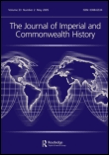
JOURNAL OF IMPERIAL AND COMMONWEALTH HISTORY
Fostering scholarly inquiry into imperial legacies.The JOURNAL OF IMPERIAL AND COMMONWEALTH HISTORY, published by Routledge Journals, Taylor & Francis Ltd, stands as a pivotal platform for scholarly discourse in the fields of imperial studies, history, and political science. This esteemed journal, with an ISSN of 0308-6534 and E-ISSN 1743-9329, has been contributing significantly to academic discussions since its inception in 1972 and continues to publish until 2024. With its categorical rankings placing it in Q1 in History, alongside emerging categories in Development and Political Science, it appeals to a wide array of researchers, professionals, and students interested in the complexities of historical and contemporary issues within imperial and commonwealth contexts. The journal's commitment to rigorous academic standards is reflected in its impressive Scopus rankings, which position it in the top percentiles of its respective fields. While currently not an open access journal, it remains a valuable resource for those looking to enhance their understanding of historical impacts and political relations in the imperial context, thereby solidifying its role as an essential tool for scholarly exploration and inquiry.
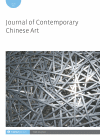
Journal of Contemporary Chinese Art
Catalyzing Conversations on Contemporary Art in ChinaThe Journal of Contemporary Chinese Art is a prestigious academic publication dedicated to advancing the discourse surrounding contemporary artworks and artistic practices in China. Published by INTELLECT LTD, this journal features insightful articles and research that catalyze discussions among scholars, practitioners, and students within the Visual Arts and Performing Arts fields. With an ISSN of 2051-7041 and an E-ISSN of 2051-705X, the journal operates without open access, yet remains a pivotal resource as reflected in its Q2 ranking in the 2023 category of Visual Arts and Performing Arts, positioning it within the 70th percentile on the Scopus Ranks. Covering a diverse range of topics from global influences on Chinese art to the socio-political dimensions of artistic expressions, the journal aims to foster a deeper understanding of contemporary cultural dynamics. Since its inception in 2019 and continuing through 2024, it has established itself as a critical platform for emerging voices and established experts alike, making it an essential read for anyone engaged in the study and appreciation of modern Chinese art.
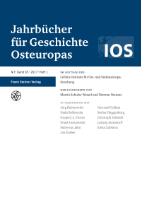
JAHRBUCHER FUR GESCHICHTE OSTEUROPAS
Decoding the Stories that Shaped Eastern EuropeJAHRBUCHER FUR GESCHICHTE OSTEUROPAS, published by FRANZ STEINER VERLAG GMBH, is a prominent academic journal dedicated to the exploration of Eastern European history. With its inception dating back to 1978, this journal has consistently provided a platform for scholarly discourse, contributing significantly to the understanding of the region's complex historical narratives. While the journal is not open access, it holds a solid reputation within the academic community, positioned in the Q4 quartile in history as per the 2023 category rankings, and stands at Rank #1636 within the Scopus Arts and Humanities History ranking. The convergence of its publication years throughout the decades emphasizes a long-standing commitment to historical research, thereby making it an essential resource for researchers, professionals, and students interested in Eastern European studies. Explore the intricate dynamics of historical events and cultural developments that shape Eastern Europe through this invaluable periodical.
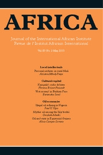
AFRICA
Celebrating Excellence in African StudiesAFRICA is a premier journal published by Cambridge University Press, dedicated to advancing scholarly research and discourse within the realms of Anthropology, Arts and Humanities, and Geography. Established in 1928, this journal has demonstrated an unwavering commitment to excellence, consistently achieving Q1 status in its respective fields as of 2023, demonstrating its impact and prestige in the academic community. With Scopus rankings highlighting it among the top 80th percentile in Social Sciences and 72nd percentile in Arts and Humanities, AFRICA serves as a vital resource for researchers, professionals, and students seeking to explore the complexities of African societies and cultures. The journal promotes a multidisciplinary approach, encouraging contributions that address contemporary challenges and opportunities within Africa. Although access is not open, AFRICA remains an essential asset for anyone aiming to deepen their understanding of the continent's diverse narratives and dynamics, publishing high-quality, peer-reviewed articles that shape the future of African studies.

Journal of the Economic and Social History of the Orient
Connecting Scholars through Rich Narratives of the OrientThe Journal of the Economic and Social History of the Orient, published by BRILL, serves as an essential platform for researchers, historians, and social scientists interested in the economic and social dynamics of the Orient. Since its inception in 1957, this journal has contributed significantly to the understanding of historical economic structures and societal transformations, offering insights that engage a wide academic audience. With an ISSN of 0022-4995 and an E-ISSN of 1568-5209, the journal maintains a reputation for quality scholarship, as reflected in its Q2 ranking in History and notable standings in the fields of Sociology and Economics. Although it is not an open-access journal, it ensures accessibility to vital research through institutional subscriptions. By exploring diverse topics within the realms of economics, sociology, and history, the journal plays a crucial role in fostering academic discourse and enhancing knowledge regarding the complex historical narratives of the Orient.
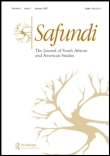
Safundi
Illuminating Cultural Dynamics and Historical ContextsSafundi, published by Routledge Journals, Taylor & Francis Ltd, is a distinguished peer-reviewed journal dedicated to exploring the intersections of culture, history, and political science. Since its inception in 2000, Safundi has contributed significantly to the discourse on cultural studies, positioning itself as a vital resource for researchers and professionals alike. With an Impact Factor reflective of its rigorous scholarship, the journal is ranked in the top quartiles for cultural studies and history, showcasing its influence and authority within these fields. The journal addresses critical contemporary issues, aiming to foster a nuanced understanding of cultural dynamics and historical contexts. While access options are traditional, Safundi remains committed to disseminating pivotal research that resonates with academics and policymakers. As it continues to evolve through to 2024, Safundi serves as an indispensable platform for students and scholars seeking to contribute to the vibrant dialogue surrounding culture and its implications in our global society.
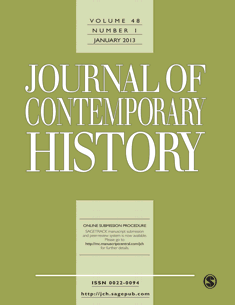
JOURNAL OF CONTEMPORARY HISTORY
Bridging History and Modernity with Scholarly InsightJOURNAL OF CONTEMPORARY HISTORY, published by SAGE PUBLICATIONS LTD, is a premier academic journal dedicated to the exploration of modern historical narratives and contemporary societal issues. Established in 1966, this journal has influenced scholarly discourse through a rich repository of research, analyses, and critical reflections, providing invaluable insights into cultural studies, sociology, and political science. With an impressive Q1 ranking in History and a notable Q2 ranking in Cultural Studies for 2023, it stands out in the academic community, ensuring rigorous peer-reviewed content that meets the highest scholarly standards. The journal is accessible through conventional subscriptions, reflecting its long-standing commitment to academic excellence. Based in the United Kingdom, it continues to serve as an indispensable resource for researchers, professionals, and students alike, bridging the gap between historical context and contemporary relevance.
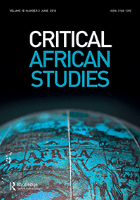
Critical African Studies
Connecting Scholars to Africa's Vital ConversationsCritical African Studies, published by TAYLOR & FRANCIS LTD, is a premier journal dedicated to advancing the discourse on critical issues affecting Africa and its diaspora. With an ISSN of 2168-1392 and an E-ISSN of 2040-7211, this journal has established itself as a leading publication in the field of Arts and Humanities, ranked Q1 in Arts and Humanities (miscellaneous) and Q2 in Social Sciences (miscellaneous) as of 2023, showcasing its commitment to high-quality research. Over its converged years from 2015 to 2024, it has become a critical platform for scholars and practitioners to explore diverse perspectives, innovative ideas, and multidisciplinary approaches to issues such as social justice, governance, and cultural narratives within the African context. The journal's Scopus rankings reflect its significant impact, with impressive placements in both the Arts and Humanities and Social Sciences categories. Critical African Studies aims to foster a robust dialogue among researchers, professionals, and students, making it essential reading for anyone interested in the complexities of Africa's socio-political landscape and cultural heritage.